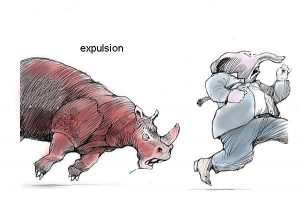Talk about playing your cards wrong.
A partner with a 3.08% interest worth $4.85 million in a partnership that owns a major shopping mall likely will walk away with only a few hundred thousand dollars after a court decision finding that he wrongfully dissolved the partnership and deducting from the value of his interest the other partners’ damages including legal fees, a 15% discount for goodwill, a 35% marketability discount, and a whopping 66% minority discount.
Last week’s decision by the Brooklyn-based Appellate Division, Second Department, in Congel v Malfitano, 2016 NY Slip Op 03845 [2d Dept May 18, 2016], rejected the partner’s appeal from the trial court’s determination of wrongful dissolution and also upheld its valuation determination with one major exception: the appellate court held that the trial court erred by failing to apply a minority discount and that it should have applied a 66% minority discount based on the “credible” expert testimony “supported by the record.”
 The Business Divorce Law Report
The Business Divorce Law Report













